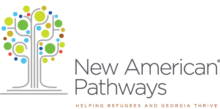Earlier this year, New AP’s Family Empowerment program ran a well-attended women’s health and family planning workshop for the Burmese community at the Clarkston Library. Guest speakers included: Dr. Gulshan Harjee, co-founder of the Clarkston Community Health Center; Amy Armstrong Wells, DeKalb County Board of Health; Rihana Nesrudin, Oakhurst Medical Center; Grace Paulsen, Reproductive Health Educator, International Rescue Committee (IRC).
Every speaker had a chance to share information about their health program services. New AP’s AmeriCorps members and Parents as Teachers (PAT) staff offered their help with set-up, language interpretation and babysitting so that attending women could focus on listening to the presenters.
Workshop attendees were thrilled to find out about free and easily accessible health program services. They learned about family planning services to help them make healthy choices, early pregnancy tests and general medical check-ups for little to no cost.
At the end of the workshop, the attendees were given time to comment and ask questions. As the audience only spoke Burmese, our PAT program teammate, Joy Lyan, helped interpret for the entire two-hour workshop. Based on the pre- and post-test survey results, the participants learned and left with a better understanding of health services.
Speakers stand ready to join our next workshop for the Nepali community in April 2019!
About New American Pathways’ Domestic Violence Prevention Program
Our program is designed to advocate for and empower victims and survivors of domestic violence. Most of our clients are immigrants and refugees living in the Atlanta community. Our services help them break the cycle of violence and execute their right to self-determination through achieving safety, stability and self-sufficiency.
The clients literally come from all over the world: Myanmar (formerly Burma), Bhutan, India, Nigeria, Ethiopia, Democratic Republic of Congo, Rwanda, Guatemala, Iraq, Syria, Afghanistan, Ukraine and Russia. Often, program participants face significant challenges and unique barriers to services ranging from limited English proficiency and the shock of initial resettlement to cultural stigma attached to the domestic violence issues.
The team of multilingual advocates provides confidential and culturally appropriate services to victims and survivors, helping them navigate the court system, strategize for their safety, and addressing the range of issues that victims must negotiate: housing, physical and mental health needs, financial support, children’s issues, and more. Advocates also support survivors as conflicting feelings arise about their abusive intimate partners. In addition to direct individual work with clients, our staff offers community workshops that are open to public. The purpose of such workshops is domestic violence prevention and raising awareness in the community.
